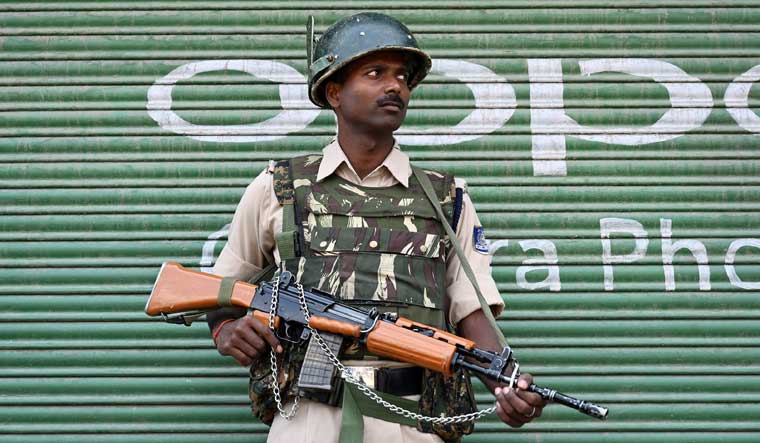Pakistan's big terror push in the Kashmir Valley during the ongoing Amarnath Yatra and attempts to cozy up to the US government have prompted the Modi government to launch a three-way offensive in Kashmir on the diplomatic, security and political front to get a grip on the situation as successive fast paced developments have put Kashmir back in the spotlight on the national and international stage.
On the security front, the first priority of the government is not to take any chances with the Amarnath Yatra. The J&K administration issued an advisory on Friday asking the Amarnath yatris to curtail their stay in the Valley keeping in view the latest intelligence inputs of terror threats.
The Pakistan army and terrorists are desperate to disrupt peace in Jammu and Kashmir attempting to attack the Amarnath Yatra, said General Officer Commanding (GOC) 15 Corps Lt. Gen. Kanwal Jeet Singh Dhillon. The Army has begun a search operation on the twin routes of the Amarnath Yatra in south and central Kashmir. A landmine with marks of a Pakistan ordinance factory, M-24 sniper rifle, a US-made rifle, telescope were among the cache of arms recovered from one of the yatra routes.
The Pakistani army and the state sponsored terrorists have activated their launch pads to carry out IED attacks on the yatra route which was supposed to be open till August 15. Intelligence sources said there were inputs last week warning of Pakistan-based terror outfits planning a terror strike on camps of security forces in south Kashmir. The sources said it is these inputs that led to a review of the security grid and prompted steps to be taken to plug the gaps and deploy more security forces on the ground.
While New Delhi's message to Pakistan is loud and clear that any misadventure would get a befitting reply, it has also not missed an opportunity to tell the United States that its military assistance to Pakistan has deeply upset it. Before the month end, New Delhi will host US Deputy Secretary of State John Sullivan for the first high-level bilateral visit after President Donald Trump's controversial remarks on Kashmir. On what could be on the agenda, a source familiar with the developments said, “the aid to Pakistan could be high on the list, but Kashmir will definitely be out.”
On the political front, the atmosphere is charged with the assembly elections likely to be announced soon resulting in a bitter political battle between the BJP and the regional parties—the PDP and the National Conference.
Speaking to THE WEEK, Jitender Singh, minister of state in Prime Ministers' Office, accused “a handful of Kashmir-centric politicians and their political parties'' of not being comfortable with normalcy being restored in Jammu and Kashmir.
“If the atmosphere opens up and the elections are held in an atmosphere of fearelessness and freedom, these beneficiaries will find their political agenda come to an end. Therefore, sometimes one tends to believe that these Kashmir-centric politicians are themselves not keen that militancy should come to an end,” said Singh.
“Just because they have ruled the roost for 30-40 years in Kashmir in an atmosphere of vaccum, they have been the beneficiaries of 8-10 per cent voter turnout through which they became members of the Lok Sabha, state assembly and formed state governments and thus carry on the hegemony in the political scene of J&K and perpetuate their dynasty,” Singh told THE WEEK.
According to Singh, the people of Kashmir, particularly the youth, have moved on and there is a very strong urge for the restoration of normalcy. “The people of Kashmir, particularly the youth, want to make the best use of avenues and opportunities made available by Modi government, particularly for the youth. Sometimes it seems the aspirations of Kashmiri youth is even more strong compared to their peers and counterparts in other parts of the country, which is evident in the last few years. We have toppers in the civil services from the most terror struck districts of Kashmir valley; we have scores of young boys and girls qualifying for IITs and medical colleges through the NEET exams. So in a nutshell, it is only a handful of Kashmir-centric politicians and their political parties which are not comfortable with normalcy getting restored.”
Singh's comments set the tone for the election campaign which will be centred around key issues. But even before the elections have kickstarted, rumour mongering and speculations have gripped the Valley. The biggest speculation is about the Centre planning some hard decisions like scrapping Section 35A which is the key instrument of Article 370 which gives special status to J&K. There is also speculation of Jammu being declared as a separate state and giving UT status for Ladakh.
Senior security sources said that these kind of speculations and rumours pose a security threat as it whips up sentiments in the Valley which could result in unrest.
On Friday, the Union home ministry officials attempted to dispel the rumours of a troop build-up clarifying that the deployment of fresh 100 companies had been ordered about a week ago. The troops are currently in the process of reaching their destinations.
“This has apparently led to speculations of induction of additional forces,” the officials said.
“Based on assessment of internal security situation and training requirements, paramilitary troops need to be rotated for rest and recuperation. Induction and de-induction of central forces is a continuous and dynamic process,'' said official sources adding that it is not the practice to discuss in public domain the details of deployment and movement of paramilitary forces in a particular theatre.



